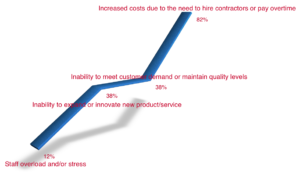
Employees are the backbone of any company; without keeping the backbone balanced it can’t stand straight. As we all know 80% of company’s growth depend on the employees.
When companies have long pending job positions it affects their employees in many ways, and also impacts it’s core business function and overall the entire company. The negative impact can be seen through employee performances, job satisfaction, productivity, teamwork and engagement.
Long pending job positions have impact at every organization level and its commitment:
As per the workforce center report:
1. At the lowest level, the inability to fill a vacancy can impact the closest group of co-workers, that have to fill in for the position, causing staff overload or stress.
2. At the intermediate level, it can impact the company financially by forcing it to pay temporary workers, contractors, placement agencies.
3. At an intermediate-high level, it impacts broader company operations such as the activities that determine business sustainability, as well as expansion and growth.
4. At the highest level, it can threaten the ability of a company to meet customer demand, meaning the core activities of a company. The effects would spill over and cause damage not only internally but externally to customers, suppliers, or the local community.
This report shows following commitment effects on the company, as a % of related cases of not filling a job in time.

Other internal and external impacts on the business:
More problems arise internally, such as role conflict, role ambiguity, lack of appropriate resources, workload mismatch, and also difficulty managing core business function activity due to insufficient staff.
As you can’t 100% focus on the core business function activity, it also impact business initiatives, and slowly company may fall behind in competition. Lack of the right people for the right task impedes the best product or service output, which can impact the brand value.
Influence on company’s culture:
When employees feel overworked due to insufficient staffing, it decreases company’s retention value and increases employee turnover. New employees don’t want to join such companies because of job withdrawal and work overload.
Overloaded staff also feel exhaustion, burnout, inefficiency, and cynicism. Exhaustion decreases product/service innovation, work quality, staff engagement, and efficiency in work etc. Burnouts not only affects the employee’s performance, but it also affects the performance of the team, the work environment and the business.
Insufficient staffing can easily lead to lack of trust by external stakeholders of the company.


